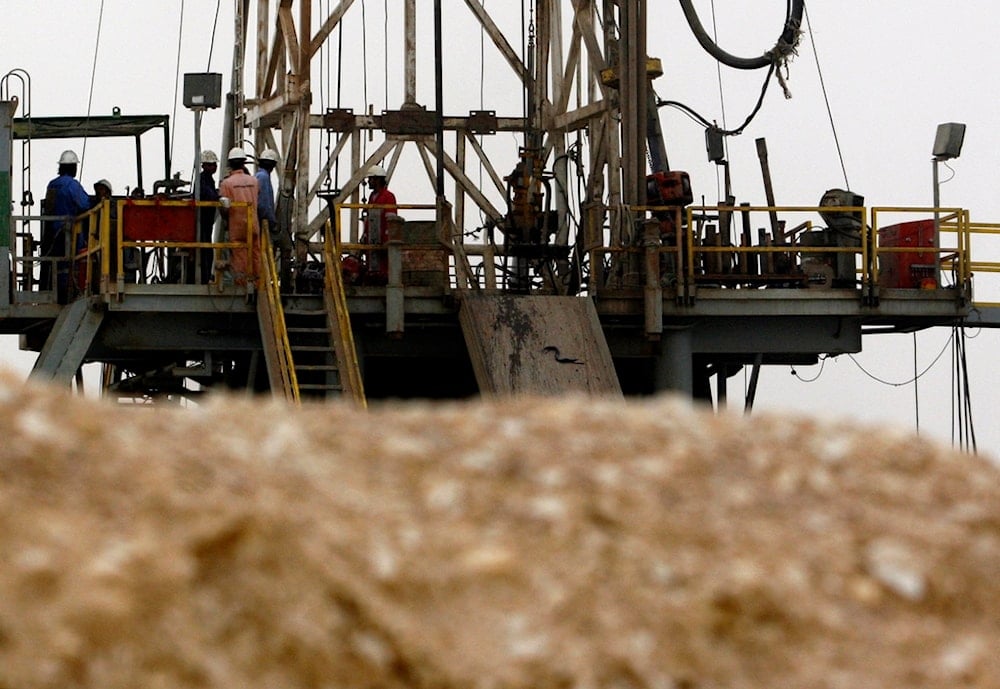Algeria to boost oil production as part of OPEC+ output hike
Algeria will increase crude oil production by 8,000 barrels per day starting July 2025, backing OPEC+’s collective decision to raise output amid rising global demand, according to Energy Minister Mohamed Arkab.
-

Oil workers stand on a new rig Tuesday, June 17, 2008, in Sakhir, Bahrain (AP)
Algerian Energy Minister Mohamed Arkab has emphasized the importance of the decision made during the recent meeting of the eight OPEC+ countries participating in voluntary output adjustments, which was held last Saturday. According to a statement released by Algeria’s Ministry of Energy on Tuesday, the group agreed to raise its overall oil supply by 411,000 barrels per day starting in July 2025.
The statement noted that Arkab affirmed Algeria’s full support for this collective decision, which comes at a time of seasonally increasing global demand for oil, particularly during the summer period.
The minister also expressed satisfaction with the additional increase in Algeria’s crude oil production, which will amount to 8,000 barrels per day beginning in July.
He added that this increase will also accompany the gradual commissioning of several newly developed oil fields, helping to better capitalize on Algeria’s national resources.
OPEC+ united on output decisions
Responding to recent media reports suggesting divisions among the eight countries participating in the voluntary output adjustments, Arkab reaffirmed the unity within the group.
He stressed that “consultations between these countries were constructive and well-coordinated, and the agreement to increase production by 411,000 barrels per day was reached unanimously.”
Arkab clarified that Algeria did not express any reservations regarding the agreed-upon adjustments and that the meeting did not include any proposals beyond the three previously approved increases. “Any claims to the contrary do not accurately reflect the course of the discussions,” he said.
The minister reiterated Algeria’s firm commitment to the principles and spirit of the OPEC+ alliance, emphasizing that Algeria’s positions have always aligned with the group’s consensus and solidarity. “In all circumstances, Algeria has rigorously and consistently fulfilled its production commitments, clearly reflecting its dedication to the objectives of the Declaration of Cooperation,” Arkab concluded.
Successive production increases
OPEC and its allies authorized in May a significant increase in oil production, approving a 411,000 barrels per day (bpd) hike for June. This followed a similar boost as the group accelerates its plan to phase out previous output cuts, despite persistent price declines and mounting concerns about global demand.
The decision came during a short online meeting on Saturday. The producer alliance reiterated that the "fundamentals of the oil market were healthy," though Brent crude prices tell a different story. Futures dropped more than 1% on Friday to $61.29 per barrel, the lowest level seen in nearly four years, reflecting investor unease over potential oversupply and slowing economic growth, exacerbated by US tariff policies.
This latest output hike is part of a scheduled rollback of a 2.2 million bpd cut agreed upon last December by eight OPEC+ countries, including Saudi Arabia, Russia, Iraq, and the UAE. With April, May, and June combined, the cumulative increase now stands at 960,000 bpd, representing a 44% unwinding of those cuts, according to Reuters estimates.
Quota clash
The internal dynamics of the alliance are growing increasingly strained. Saudi Arabia has taken aim at Iraq and Kazakhstan for allegedly repeatedly breaching their production ceilings. "Saudi Arabia repeated its warnings against poor compliance on Saturday," said one source. The move reflects Riyadh's refusal to continue shouldering the burden of market stabilization, a role it has played since the 2020 price collapse.
Tensions with Kazakhstan escalated last month after its energy minister publicly prioritized national interests over OPEC+ discipline. The country exceeded its output quota in April despite a 3% overall decline in production.
"Compliance again appears to be the key focus, with Kazakhstan and Iraq continuing to miss their compensation targets, alongside Russia to a lesser extent," said Helima Croft of RBC Capital Markets in a statement to Reuters last month.

 4 Min Read
4 Min Read










